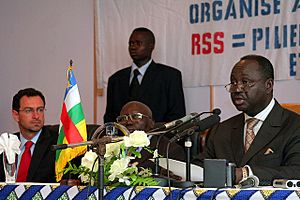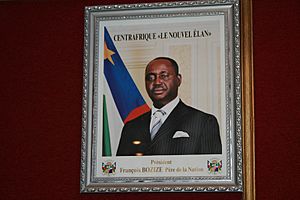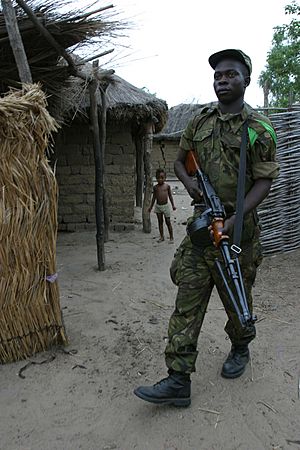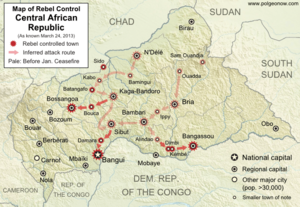François Bozizé facts for kids
Quick facts for kids
François Bozizé
|
|
|---|---|
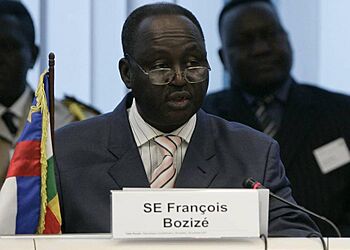
Bozizé in 2007
|
|
| 6th President of the Central African Republic | |
| In office 15 March 2003 – 24 March 2013 |
|
| Prime Minister |
|
| Vice President | Abel Goumba (2003–2005) |
| Preceded by | Ange-Félix Patassé |
| Succeeded by | Michel Djotodia |
| Minister of Defense | |
| In office ? – March 2003 |
|
| Personal details | |
| Born |
François Bozizé Yangouvonda
14 October 1946 Mouila, French Equatorial Africa (now Gabon) |
| Political party | National Convergence "Kwa Na Kwa" |
| Spouse | Monique Bozizé |
| Signature |  |
François Bozizé Yangouvonda (born 14 October 1946) is a politician from the Central African Republic. He served as the country's President from 2003 to 2013. He was the only Central African president born in what is now Gabon.
Bozizé became a high-ranking army officer in the 1970s. After Jean-Bédel Bokassa was removed from power, Bozizé worked in the government. He was the Minister of Defense from 1979 to 1981 and Minister of Information from 1981 to 1982. He was involved in a failed attempt to take power in 1982 and then left the country.
Years later, he became the Army Chief of Staff under President Ange-Félix Patassé. However, he started a rebellion against Patassé in 2001. Bozizé's forces took control of the capital city, Bangui, in March 2003. This happened while Patassé was out of the country. Bozizé then took power and led a temporary government. He won the presidential election in 2005 and was re-elected in 2011.
In December 2012, the Central African Republic faced a new uprising. Rebel groups said Bozizé's government had not kept its promises from earlier peace agreements. On 24 March 2013, Bozizé left the country after rebels attacked Bangui and took over the presidential palace. He went to Cameroon.
Contents
Early Life and Political Beginnings
Bozizé was born in what is now Gabon. He is a member of the Gbaya people. He went to a military training college in the Central African province of Bouar. He became a second lieutenant in 1969 and a captain in 1975. In 1978, he was made a Brigadier General by Jean-Bédel Bokassa.
After Bokassa was removed from power in 1979, Bozizé became the Minister of Defense. Later, in September 1981, André Kolingba took power. Bozizé was then appointed Minister of Information. However, he fled to the north of the country after being involved in a failed attempt to take power on 3 March 1982. He then found safety in France. For much of the 1980s, he also lived in Benin.
Bozizé was arrested in Cotonou in July 1989. He was put on trial by Kolingba for helping the coup attempt. He was found not guilty on 24 September 1991 and released from prison on 1 December. He then went back to France for almost two years.
In the 1993 election, Bozizé ran for president as an independent candidate. He received 1.5% of the total votes. Since no candidate won a majority, a second election was held between the top two candidates. Ange-Félix Patassé won and became president.
Working with President Patassé
For many years, Bozizé was seen as a supporter of President Patassé. He helped Patassé stop army rebellions in 1996 and 1997. Bozizé was named the Armed Forces Chief of Staff. He often helped put down revolts against the president.
On 28 May 2001, there was an attempt to overthrow Patassé. It was stopped with help from troops from Libya and rebels from the Democratic Republic of the Congo. After this, people started to question Bozizé's loyalty. In late October 2001, he was removed from his position as Army Chief of Staff. Fighting started when the government tried to arrest Bozizé on 3 November. After five days of fighting, Bozizé fled north to Chad.
Fighting between government forces and Bozizé's rebels continued in 2002. From 25 to 31 October, his forces unsuccessfully attacked the capital, Bangui. Soldiers who helped Patassé were accused of stealing and other bad acts. During this time, there were tensions between Chad and Patassé's government. Patassé's party accused the Chadian president of causing problems in the Central African Republic by helping Bozizé.
Taking Power and Presidency
On 15 March 2003, Bozizé finally succeeded in taking power. His forces entered Bangui without resistance. Patassé was returning from a meeting but could not land because Bozizé's forces controlled the airport. Patassé found safety in Cameroon and then Togo.
On 23 March, Bozizé appointed Abel Goumba as prime minister. In December, he made Goumba Vice-President and appointed Célestin Gaombalet as prime minister. Bozizé suspended the country's 1995 constitution after taking power. A new constitution was approved by voters in a referendum on 5 December 2004. After taking power, Bozizé first said he would not run in the next presidential election. However, after the new constitution was approved, he announced on 11 December that he would run.
In December 2004, a new constitution was approved. It allowed for a semi-presidential system and a two-term limit for the president. Bozizé was one of five candidates approved to run in the presidential election in early 2005. The election was delayed by one month to 13 March.
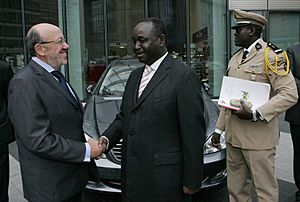
Bozizé came in first in the 13 March election. He won just under 43% of the votes. He then faced Martin Ziguélé in a second round of voting. This was held on 8 May. According to official results, Bozizé won with 64.6% of the vote. He was sworn in on 11 June.
The National Assembly allowed Bozizé to rule by special orders for three months, from 1 January to 31 March 2006. His prime minister said this period was successful. It helped Bozizé make the government services more efficient.
Bozizé also served as the Minister of National Defense since he took power. He kept this role when he appointed a new government in June 2005 and again in September 2006.
In early 2006, Bozizé's government seemed stable. However, there were still threats from supporters of the former president. On 13 April 2007, a peace agreement was signed between the government and a rebel group called the UFDR. This agreement offered forgiveness for the UFDR fighters. It also recognized them as a political party and allowed their fighters to join the army. More talks in 2008 led to an agreement for peace and a government of unity.
In January 2008, Bozizé appointed a new government. He kept the defense role for himself. He also appointed his son, Francis Bozizé, to work under him as a Minister-Delegate. His sister, Yvonne M'Boïssona, was also reappointed to the government. His nephew, Sylvain Ndoutingai, served as Minister of State for Mines, Energy, and Water Resources.
In February 2010, former president Kolingba passed away in France. In early March, Bozizé led his burial ceremony in Bangui. That same week, Bozizé set the date for the next presidential election for 25 April 2010. The elections were postponed several times but were eventually held in January and March 2011. Bozizé and his political party both won in these elections.
In December 2010, Bozizé issued a special order. It officially restored the good name of former military leader Bokassa. Bozizé stated that Bokassa had "given a great deal for humanity."
Central African Bush War
Soon after Bozizé took power, the Central African Republic Bush War began. This was a rebellion led by the Union of Democratic Forces for Unity (UFDR). The fighting grew quickly in 2004. The UFDR rebel forces included several allied groups.
On 17 April 2004, security forces reportedly killed eight "Liberators." These were Chadian fighters who had helped Bozizé take power in 2003. Before the killings, these fighters had caused trouble and demanded payment from President Bozizé for their help. The President reportedly paid each Liberator $1,000 before they supposedly returned to Chad.
During the first year, many parts of the country faced insecurity and conflict. In April 2004, the government sent 200 soldiers to fight crime in the northern provinces. Some human rights observers believed that many of the armed groups were the same rebels and mercenaries who helped Bozizé take power. They thought this was because Bozizé had not been able to pay them.
Between 2006 and 2007, President François Bozizé held talks with rebel groups and political opponents to try to end the fighting. He signed peace agreements with two rebel groups, but instability continued to rise. Further talks in 2008 led to an agreement for peace, a unity government, and elections.
During this war, many people were killed. Houses were burned, and villages were destroyed. Many people also lacked drinking water. Around 10,000 people were forced to leave their homes because of the conflict.
Bozizé was involved in creating the Anti-balaka militias. These groups later caused harm to many citizens.
Challenges and Corruption
Even though the Central African Republic has many minerals and good land for farming, many of its people live in poverty. The average life expectancy for men went down during Bozizé's time as president. In 2009, the country's economic output per person was very low. This was connected to corruption, which increased under Bozizé's rule. There were also issues with diamond smuggling.
After he was removed from power, Bozizé was linked to a major corruption case. He was accused of taking large sums of money, properties, and luxury cars. These were allegedly in exchange for allowing a French mining company to operate in Bakouma.
International Relationships
- Chad: After Bozizé took power, he and Chadian president Idriss Déby formed a strong political relationship. Their goal was to stop rebel groups on both sides of the border from working together. In April 2006, Chadian rebels used the Central African Republic as a path to attack Chad. Bozizé responded by closing the border between Sudan and the Central African Republic.
- France: Since 1998, France had no military presence in the Central African Republic. After Bozizé became president, military ties with France were restored. A French general was sent to be Bozizé's advisor.
Religious Views
Bozizé is a follower of the West African Celestial Church of Christ. Before the 2003 coup, he had been accused of using the church to recruit people for his rebellion. He became the main leader of this church in the Central African Republic in May 2012.
Some experts say that Bozizé's presidency was marked by strong, aggressive language. This language was influenced by the Celestial Church. He used harsh words against certain groups, which led to more negative feelings towards the Central African Muslim community. Some parts of the Anti-balaka militias were also connected to the Celestial Church.
Civil War and Overthrow
On 10 December 2012, a rebel group called the Séléka took control of several towns. Rebels fought with government troops for over an hour before securing the town of N'Délé. On 27 December, Bozizé asked for international help to deal with the rebellion. He specifically asked France and the United States. However, French President François Hollande said that the French troops in the country were not there to get involved in internal affairs.
On 11 January 2013, a ceasefire agreement was signed in Libreville, Gabon. The rebels dropped their demand for Bozizé to resign. However, he had to appoint a new prime minister from the opposition party by 18 January 2013. On 13 January, Bozizé signed an order that removed Prime Minister Touadéra from power as part of the agreement. On 17 January, Nicolas Tiangaye was appointed prime minister.
By 22 March, the rebels had started advancing again. They accused Bozizé of not keeping his promises from the January ceasefire agreement. They took towns across the Central African Republic. They advanced to within 22 kilometers of Bangui but were stopped by an attack helicopter. However, a rebel spokesman claimed they shot down the helicopter.
On 24 March, rebel forces heavily attacked Bangui and took control of important buildings, including the presidential palace. Bozizé's family fled across the river to the Democratic Republic of the Congo. Bozizé then went to Yaoundé, the capital of Cameroon, where he was given temporary safety. He later asked Benin for political asylum.
Life in Exile and Later Elections
Bozizé was forced to leave the country after being overthrown by Michel Djotodia in a coup in 2013. While in exile, Bozizé went to Cameroon. There, he was hosted by Paul Biya, the president of Cameroon. An arrest warrant was issued for him on May 30, 2013. Bozizé was accused of many arrests, kidnappings, and detentions. He was also accused of the destruction of nearly 4,000 homes.
His political party, Kwa Na Kwa, announced on 10 August 2015 that Bozizé would return to the country. They said he would run as a candidate in the October 2015 presidential election. However, on 8 December 2015, the Constitutional Court announced the list of approved presidential candidates. Bozizé, who was still in exile, was not allowed to run. Officially, he was excluded because he was not registered to vote. Also, he had agreed not to run again as part of the peace agreement in January 2013. Gunfire was reported in parts of Bangui as his supporters reacted angrily to the news. His party said that Bozizé's exclusion was "the result of internal and external pressure." Many of his supporters claimed that the French government was involved in the decision.
At the end of 2019, Bozizé returned to the Central African Republic. He announced his presidential candidacy for the upcoming elections. However, on 3 December 2020, the Constitutional Court ruled that Bozizé did not meet the "good morality" requirement for candidates. This was because of an international arrest warrant and United Nations actions against him for alleged serious crimes. The government then accused Bozizé of planning to overthrow the government.
On 22 September 2023, Bozizé, who had fled to Chad before moving to Guinea-Bissau, was sentenced to life in prison by the Bangui Court of Appeal for various crimes. On 30 April 2024, a special court in Bangui issued an international arrest warrant against him. This was for human rights abuses that happened during his presidency. However, Guinea-Bissau, where Bozizé is currently living, does not allow for people to be sent back to other countries for trial.
See also
 In Spanish: François Bozizé para niños
In Spanish: François Bozizé para niños
 | Stephanie Wilson |
 | Charles Bolden |
 | Ronald McNair |
 | Frederick D. Gregory |


